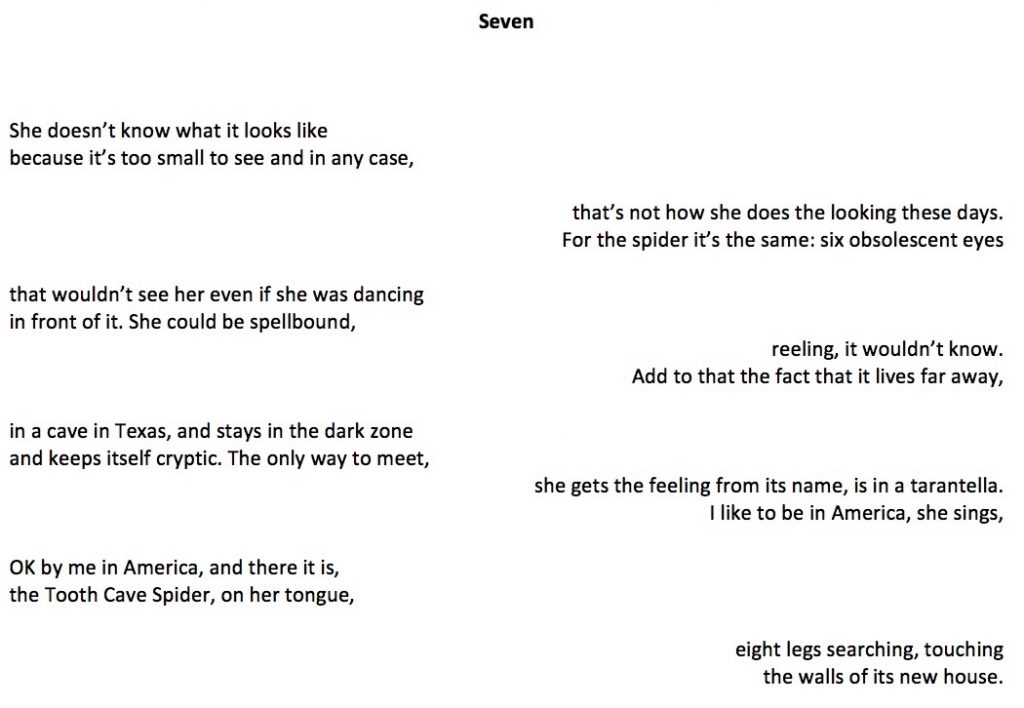Drawing on psychoanalytic perspectives, Dr Zayneb Allak’s work explores ways in which writing spiders into being—unexpectedly, unpredictably and uncannily. In ‘Che cos’è la poesia?’, Jacques Derrida describes the advent of the poem in distinctly spidery terms: ‘The gift of the poem cites nothing, has no title, its histrionics are over, it comes along without your expecting it, cutting short the breath’ (Derrida 2008, p.536). Sudden and strange, writing appears. Emerging from its uncanny hiding place, it looks like something quite different until you see it close up. It rarely goes where you want it to go, and when it goes where it wants to go, you can’t help but gasp.
References:
Jacques Derrida, ‘Che cos’è la poesia?’ [1988] in Poetry in Theory: An Anthology 1900-2000, ed. Jon Cook, (Oxford: Blackwell, 2008), pp.533-537
Spider Fact [extract]
From Spider Poetics: Writing the Uncanny

Spider Fiction [extract]
from Spider Poetics: Writing the Uncanny
Throughout ‘Spider Fact’ words that are also real spider names build fantastical, illusory spider bodies: in poem one, for example, spiders are ‘flame-kneed, orange-mouthed’, ‘star-bellied, feather-legged’. In other words, real words conjure unreal spiders. If we take a closer look at the spider that sits in poem seven we will see that it cannot look back at us—its eyes are ‘obsolescent’. It depends on its ‘eight limbs searching, touching’ to locate itself, to find the limits of the environment in which it finds itself, to feel ‘the walls of its new house’. Its ‘house’ is a mouth, the foundations on which it stands are a ‘tongue’. It has arrived there by way of its name, or more precisely, the words that constitute its name: ‘the Tooth Cave Spider’. ‘Tooth Cave Spider’ is a real name (for a real species, endangered now, almost homeless, since many of the caves in which it lives in Texas have been destroyed for urban development) that also contains an illusory double: an image of a cavity, a cave with teeth, a mouth. The illusion summons the spider. The process of bringing the word to the mouth is a rhythmical enchantment, like the tarantella, ’I like to be in America’. The narrator feels its name in her mouth, its phantom body on her tongue.
Nicolas Abraham and Maria Torok explore the real and the illusory in terms of introjection and incorporation. In his introduction to their text, The Shell and the Kernel: Volume 1, Nicholas Rand states that research by Abraham and Torok ‘shifts Freudian modes of thinking—for example, seeing early parental figures as enduring inhibitors of sexual instinct or as inevitable objects of conflictual love—toward the work of introjection’ (Abraham and Torok 1994, p.10). He describes the process of introjection as ‘the work of psychic opening or expansion, accomplished at any age and in the face of every sort of new experience’, summarizing it in terms of three stages:
(1) Something new or foreign (whether good or bad) occurs in me or to me. (2) I turn myself into that which this new ‘thing’ has done to me; I familiarize myself with it through play, fantasy, projection (or any number of other activities); in sum, I appropriate it for myself. (3) I become aware of what has occurred and of my own gradual encounter with it […] This threefold process successively entails an occurrence, my work of appropriation, and my awareness, memorialized through naming. (p.14)
This summary resembles a process with which this project is familiar: an encounter, a tentative approach, a transfiguration, a naming. A spider poetics. Abraham and Torok contrast introjection to their notion of ‘incorporation’, stating: ‘Incorporation denotes a fantasy, introjection a process’ (p.125). If introjection is an assimilative, transformative process of growth, of becoming, incorporation involves fantasy, a denial of reality, a refusal to assimilate loss. Abrahams and Torok write: ‘in order not to have to “swallow” a loss, we fantasize swallowing (or having swallowed) that which has been lost, as if it were some kind of thing’ (p.127). In order not to swallow a loss, what does Spider Poetics fantasize about swallowing?
It’s on the tip of my tongue—something is missing but I can’t say what.
References:
Nicolas Abraham and Maria Torok, The Shell and the Kernel: Renewals of Psychoanalysis (Chicago: University of Chicago Press, 1994)
